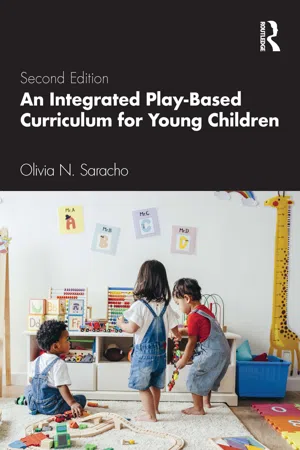
- 394 pages
- English
- ePUB (mobile friendly)
- Available on iOS & Android
An Integrated Play-Based Curriculum for Young Children
About this book
An Integrated Play-Based Curriculum for Young Children, Second Edition explores how to integrate play across the curriculum, helping teachers develop their early childhood curriculum using developmentally and culturally appropriate practice. Distinguished author Olivia N. Saracho offers a theoretical framework for understanding the origins of an early childhood play-based curriculum and illuminates how young children learn and understand concepts in a social and physical environment. This second edition has been fully updated throughout and its comprehensive coverage has been expanded with entirely new sections on technology and social media, cultural differences in play, and teaching English language learners and students with disabilities. Packed with vignettes, activities, and practical examples, this text is essential reading for pre-service teachers seeking appropriate theoretical practices for designing and implementing a play-based curriculum.
Tools to learn more effectively

Saving Books

Keyword Search

Annotating Text

Listen to it instead
Information
Chapter 7
Social Studies—Play Learning Experiences
Education in its broadest sense, is the means of this social continuity in life.(Dewey, 1916, p. 3)
… the integrated study of the social sciences and humanities to promote civic competence. Within the school program, social studies provides coordinated, systematic study drawing upon such disciplines as anthropology, archaeology, economics, geography, history, law, philosophy, political science, psychology, religion, and sociology, as well as appropriate content from the humanities, mathematics, and natural sciences. The primary purpose of social studies is to help young people make informed and reasoned decisions for the public good as citizens of a culturally diverse, democratic society in an interdependent world.(NCSS, 2010, p. 6)
Social Studies Early Childhood Education Pioneers
Contemporary Early Childhood Influences
The Social Studies Program
depth of historical, political, and cultural understanding is essential if this democracy is to survive and thrive. Powerful social studies teaching helps students develop enduring understandings in the core content areas of civics, economics, geography, and history, and assures their readiness and willingness to assume citizenship responsibilities. Powerful social studies learning leads to a well-informed and civic-minded citizenry that can sustain and build on democratic traditions.(Pace, 2007, p. 27)
… to establish a learning environment and instruction to enable each student to understand, participate, and make informed decisions about their world. Social studies explain students’ relationships to other people, to institutions, and to the environment. It equips them with the knowledge and understanding of the past necessary for coping with the present and planning for the future. It provides them with the skills for productive problem solving and decision making, as well as for assessing issues and making thoughtful value judgments. Above all, it integrates these skills and understandings into a framework for responsible citizen participation, whether in the school, the community, or the world.(NCSS, 2019, pp. 1–2)
Table of contents
- Cover
- Half Title
- Title Page
- Copyright Page
- Dedication
- Contents
- Preface
- Acknowledgments
- Section I Play in the Context of Early Education
- Section II Theoretical Perspectives
- Section III Educational Foundations
- Section IV Educational Perspectives
- References
- Index
Frequently asked questions
- Essential is ideal for learners and professionals who enjoy exploring a wide range of subjects. Access the Essential Library with 800,000+ trusted titles and best-sellers across business, personal growth, and the humanities. Includes unlimited reading time and Standard Read Aloud voice.
- Complete: Perfect for advanced learners and researchers needing full, unrestricted access. Unlock 1.4M+ books across hundreds of subjects, including academic and specialized titles. The Complete Plan also includes advanced features like Premium Read Aloud and Research Assistant.
Please note we cannot support devices running on iOS 13 and Android 7 or earlier. Learn more about using the app